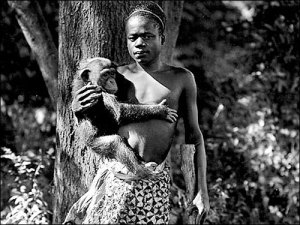Review: The Human Zoo on Channel 4
By Juliana Adelman
In March of 1916 Ota Benga (pictured left) went into a barn in Lynchburg, Virginia and shot himself. Twelve years prior Benga, an African Pygmy, had been brought to St Louis as part of an exhibition of races for the 1904 World’s Fair. Benga was suspended between cultures: he chose not to stay in the Congo when he was returned there in 1906 but neither did he manage to make America home. The Human Zoo: science’s dirty secret retrieves Benga’s story as part of a series on science and race being broadcast on Channel 4. The programme links the 1904 exhibition, and others like it, to the development of Adolf Hitler’s ideas about racial purity. The Human Zoo claims that exhibitions of so-called primitive races during the 19th and early 20th centuries contributed to persuading the millions of people who attended them that science had proven white superiority.
Human exhibits were common and popular during the 19th century and well into the 20th. In Dublin, the ‘Ioway Indians’ passed through in the 1830s and the zoo’s proprietors allowed them to keep the gate proceeds that their visit attracted. As The Human Zoo‘s narrator points out, when travel was limited to the wealthy and adventurous, the only way to see different kinds of people was as at such a show.
This programme is worth a watch (free for another 29 days on the Channel 4 website, linked above) as it touches on some interesting and tricky ideas. However, it falls rather short of being as compelling as it might have been. They do the usual combination of talking heads (several anthropologists, one academic historian, descendants of those involved in Benga’s capture and exhibition) with archival footage. In addition, they’ve thrown in random footage of 4th of July in St Louis and got attendees to read cue cards containing advertising material about Benga and the Pygmies from 1904.
There are several major problems with the approach and the conclusions. First, the lack of Africans or African Americans is glaring and bizarre. No one seems interested in thinking about what Ota Benga made of segregated America, whether he felt superior or inferior to black Americans, what black Americans thought of him, etc. They don’t get any historians to discuss the exhibit in the context of contemporary race relations in the US. And the film crew only managed to find one black woman in St Louis to read their cue cards. It actually left me wondering if only white people are anthropologists (which would be interesting in and of itself).
Then there’s the Hitler business. A friend once told me that in any internet chat room you’re only ever three replies away from someone mentioning the Fuhrer. I occasionally wonder if the same might be said of television. Yes, Hitler was influenced by the racial ideas of his time. Yes, the proprietor of the Bronx Zoo (where Benga was exhibited with apes and monkeys) wrote a book on race that Hitler appears to have liked. But the focus of Hitler’s race policies was not Africans, but gradations of people we would consider white. Far more influential, I would have thought, were eugenical ideas about the fitness of various groups of ‘civilised’ people. Racial exhibitions seem to me to have appealed to basic curiosity and reflected existing racism, rather than popularizing new racist ideas. The Human Zoo might have delved a bit deeper into the links between the sciences of anthropology and eugenics. After all, believing some races should be systematically annihilated is quite a jump from thinking they are inferior.
One of the most interesting parts of the film is the close, where each presenter (except the well-spoken Italian anthropologist) seems unable to answer the question of whether races really exist. Some of the other parts in the series on race and science look interesting and credit is due to Ch4 for bringing up a touchy but important subject.
Source:
Review: The Human Zoo on Channel 4 « Pue's Occurrences

No comments:
Post a Comment